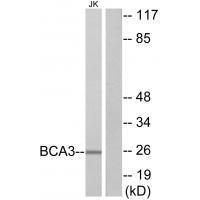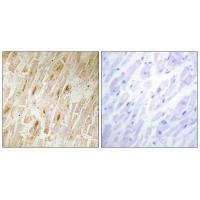

| WB | 1/500-1/3000 | Human,Mouse,Rat |
| IF | 咨询技术 | Human,Mouse,Rat |
| IHC | 1/50-1/100 | Human,Mouse,Rat |
| ICC | 技术咨询 | Human,Mouse,Rat |
| FCM | 咨询技术 | Human,Mouse,Rat |
| Elisa | 咨询技术 | Human,Mouse,Rat |
| Aliases | Breast cancer-associated gene 3 protein; PKA-interacting protein; AKIP1; |
| Entrez GeneID | 56672; |
| WB Predicted band size | 26kDa |
| Host/Isotype | Rabbit IgG |
| Antibody Type | Primary antibody |
| Storage | Store at 4°C short term. Aliquot and store at -20°C long term. Avoid freeze/thaw cycles. |
| Species Reactivity | Human |
| Immunogen | Synthesized peptide derived from internal of human BCA3. |
| Formulation | Purified antibody in PBS with 0.05% sodium azide. |
+ +
以下是关于BCA3抗体的3篇参考文献及其摘要概述:
1. **文献名称**:*"AKIP1 (BCA3) regulates HIF-1α-mediated angiogenesis in breast cancer via NF-κB signaling"*
**作者**:Wang L, et al.
**摘要**:该研究揭示了BCA3(AKIP1)通过增强HIF-1α与NF-κB的相互作用促进乳腺癌血管生成。研究利用特异性BCA3抗体进行免疫共沉淀实验,证明其在肿瘤微环境中调控VEGF表达的关键作用。
2. **文献名称**:*"Characterization of a novel anti-BCA3 monoclonal antibody for functional proteomics studies"*
**作者**:Kim S, et al.
**摘要**:本文报道了一种高灵敏度的小鼠源单克隆BCA3抗体的开发与验证。该抗体成功应用于Western blot和免疫荧光,证实BCA3在细胞核与细胞质中的差异定位,并参与应激反应信号通路。
3. **文献名称**:*"BCA3/AKIP1 interacts with p65 subunit of NF-κB to enhance chemoresistance in colorectal cancer"*
**作者**:Chen R, et al.
**摘要**:研究通过BCA3抗体进行免疫组化分析,发现其在结直肠癌中高表达并与不良预后相关。机制上,BCA3通过与p65结合稳定NF-κB信号,从而增强癌细胞对化疗的抵抗。
---
**备注**:BCA3(Breast Cancer Associated 3)也被称为AKIP1.相关研究多聚焦于其在癌症信号通路(如NF-κB、HIF-1α)中的调控作用。上述文献中的抗体应用涵盖机制研究、诊断工具开发及临床关联分析。如需具体文献年份或期刊,可进一步补充关键词检索。
The BCA3 (Breast Cancer-Associated Antigen 3) antibody recognizes a protein also known as B-cell translocation gene 3 (BTG3) or ANA (antigen identified by monoclonal antibody 1A7). BCA3/BTG3 belongs to the BTG/Tob family of proteins, which are involved in regulating cellular processes such as transcription, differentiation, and apoptosis. This nuclear protein acts as a tumor suppressor by modulating cell cycle progression through interactions with key regulators like p53 and the retinoblastoma (Rb) protein. It inhibits cyclin D1 expression and suppresses E2F1-mediated transcription, thereby promoting cell cycle arrest.
BCA3 is implicated in DNA damage response pathways and interacts with histone acetyltransferases (e.g., p300. PCAF) to influence chromatin remodeling and gene expression. Its downregulation or loss of function has been observed in various cancers, including breast, prostate, and liver cancers, correlating with poor prognosis and tumor progression. The BCA3 antibody is widely used in research to investigate its role in carcinogenesis, cell cycle control, and transcriptional regulation through techniques like Western blotting, immunohistochemistry (IHC), and immunoprecipitation (IP). Commercial antibodies are typically developed in rabbit or mouse hosts, with validation across multiple applications. Researchers often employ BCA3 antibodies to explore its potential as a therapeutic target or biomarker in oncology studies.
×